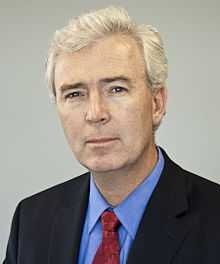Daniel Carlin
| Daniel Carlin | |
|---|---|
 Carlin, circa 2011 | |
| Born | September 27, 1959 |
| Nationality | American |
| Fields | Emergency Medicine, Connected Care, Telemedicine, Infectious Disease |
| Alma mater | Carnegie Mellon University (B.S.) Tufts University School of Medicine (M.D.) |
| Known for | Telemedicine |
| Notable awards |
Health Professions Scholarship Program Scholarship Recipient, US Navy Research Clerkship, Clinical Presentation of A.I.D.S. Related Illnesses, Cornell University School of Medicine, Department of Tropical and Infectious Disease, Port Au Prince, Haiti |
Daniel Carlin, MD (born September 27, 1959) is the founder and CEO of the connected care concierge telemedicine practice WorldClinic. He is a former U.S. Navy Chief Medical Officer who has served as a refugee camp physician on the Afghanistan-Pakistan frontier.[1] Carlin is board certified in Emergency Medicine and holds a consultant-staff appointment at Lahey Hospital and Medical Center in suburban Boston. He has been in practice for 29 years.
Education
Dr. Carlin graduated from Carnegie Mellon University in Pittsburgh, Pennsylvania with a double degree in chemistry and philosophy. He earned his medical degree from Tufts University School of Medicine in Boston, Massachusetts.[2]
Career
Carlin founded Voyager Medicine in 1996 to remotely treat seafaring crews. Operating from land, he used his beeper and cell phone to provide real-time medical consultations for sick and injured sailors. This business venture put him at the forefront of the emerging field of telemedicine healthcare.[3]
Carlin is a recognized leader in the field of connected care and promotes the use of the latest mobile health devices to provide personal health diagnosis, treatment, and health management to patients.[4] In 1998 he founded WorldClinic and achieved notoriety after he e-mailed life-saving surgical instructions to Viktor Yazykov, a solo yacht racer participating in the Around Alone yacht race.[5] Fifty-year-old Yazykov, suffering from a dangerous elbow infection and 1,000 miles away from the coast, was able to successfully self-operate after receiving Carlin’s diagnosis and guidance using e-mail.[6] The story received worldwide attention and was featured in The New York Times,[7] the British Broadcasting Corporation,[8] Dateline NBC, Oprah, The Today Show, and others.
Later that year, Carlin expanded WorldClinic to include islands, remote homes, and key employees of global corporations.[9] Since then, the company's work has been featured in Bloomberg Businessweek,[10] Forbes,[11][12] Fortune,[13] Financial Times,[14] and The Wall Street Journal.
Carlin is a frequent speaker to both medical and international development audiences and has lectured at institutions such as MIT Media Lab, US Naval Academy, Cleveland Clinic, and the International Economic Development Council. He also writes a regular column on health issues for Worth Magazine[15] and is frequently quoted on the topics of healthcare, mHealth, and telemedicine.
See also
References
- ↑ Prince, Russ (6 July 2011). "Global Healing". Private Wealth magazine. Retrieved 7 April 2015.
- ↑ "Company Overview of WorldClinic, Inc.". Bloomberg Business. Retrieved 7 April 2015.
- ↑ Hammond, Ruth (Summer 2002). "Telemedicine Pioneer Treats Patients Any Time, Anywhere". Carnegie Mellon magazine. Retrieved 7 April 2015.
- ↑ Griffith, Ted (28 June 1999). "Doctor, Lahey Clinic start global telemedicine venture". Boston Business Journal. Retrieved 7 April 2015.
- ↑ "Around Alone – Viktor Yazykov finishes". Yachting World. 16 November 1998. Retrieved 7 April 2015.
- ↑ "Ship Shape A Boston Doctor Helps Save a Lone Russian Sailor's Life by Making a High-Tech House Call to the High Seas" (PDF). People magazine. 7 December 1998. Retrieved 7 April 2015.
- ↑ Lloyd, Barbara (22 November 1998). "Survival in the South Atlantic, Thanks to Boston E-mail". The New York Times. Retrieved 7 April 2015.
- ↑ "DIY surgery on the seven seas". BBC News. 18 November 1998. Retrieved 7 April 2015.
- ↑ Stolberg, Sheryl (4 July 1999). "Ideas & Trends; From M.D. to I.P.O., Chasing Virtual Fortunes". The New York Times. Retrieved 7 April 2015.
- ↑ Ody, Elizabeth (16 March 2012). "Wealthy Families Skip Waiting Rooms With Concierge Medical Plans". Bloomberg Business. Retrieved 7 April 2015.
- ↑ Prince, Russ (19 November 2013). "Continuous Connected Concierge Care… The Future of Healthcare". Forbes. Retrieved 7 April 2015.
- ↑ Prince, Russ (30 May 2013). "What Is Concierge Healthcare?". Forbes. Retrieved 7 April 2015.
- ↑ Wise, Jeff (25 October 1999). "E-medicine for extreme adventurers, traveling executives, and other wackos- Do-it-yourself surgery: It's easier than ever!". Fortune magazine. Retrieved 7 April 2015.
- ↑ Ryckman, Pamela (22 March 2008). "Personal healthcare by remote control". Financial Times. Retrieved 7 April 2015.
- ↑ Carlin, Dan (February 2013). "Obamacare and You" (PDF). Retrieved 7 April 2015.